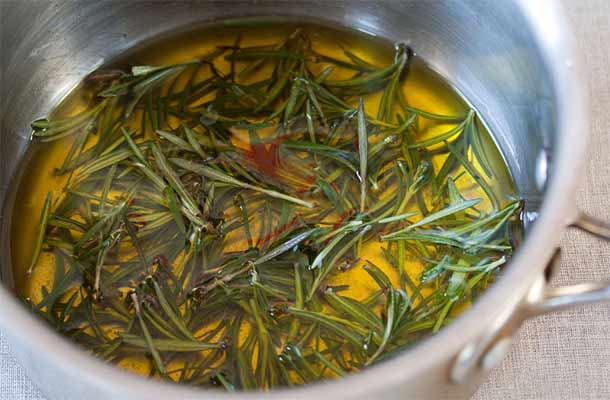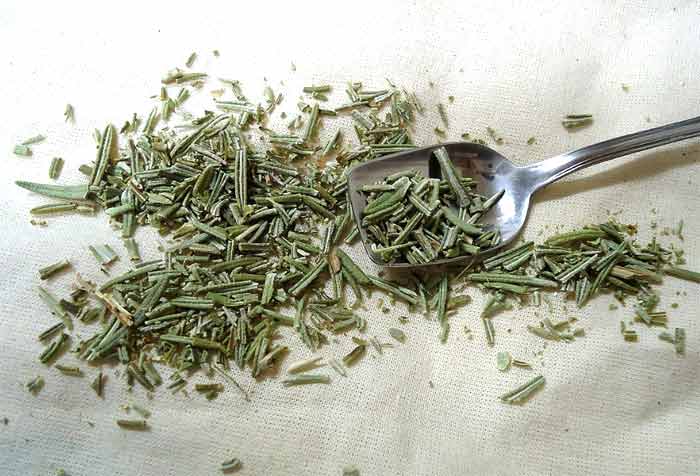Rosemary in herbal medicine

Rosemary (Rosmarinus officinalis) is an uplifting and energizing herbal remedy. The versatile plant is used to promote good digestion, as a circulatory stimulant, and anti-depressant.
Rosemary is used in the treatment of exhaustion, weakness, jet lag, chills, rheumatism, arthritis, breast pain, cysts, scalp problems, headaches, flu, and Alzheimer’s.
Cold feet and hands? Drink rosemary tea to get the blood flowing bringing warmth to the whole body.
A distinctive essential oil, made from the leaves of the rosemary plant, is very useful to herbalists, aromatherapists, and their patients. I use it in muscle rubs and hair rinses.
Rosemary essential oil is known as the Dew of the Sea. It is a favorite scent in aromatherapy.
Rosemary is the most stimulating of all essential oils! Rosemary essential oil is strong, clean, refreshing, uplifting, and slightly minty with a hint of pine.
Rosemary is used in herbal medicine and aromatherapy to uplift the spirit, improve memory, and energize the body.
It is also used as a culinary herb, flavoring everything from meat to savory breads.

Rosemary is astringent, antiseptic, and diuretic.
Rosemary is considered an excellent tonic and all round stimulant with properties that promote sweating and increase bile flow. Rosemary is used in herbal tonics, tinctures, teas, compresses, and poultices.
Rosemary essential oil is often used in massage.
Rosemary essential oil makes a stimulating and soothing rub for arthritic conditions and sore muscles. Combine with grape seed or almond oil, leave on skin, and let it soak in overnight for best results.
Rosemary essential oil is also used in aromatherapy to treat headache, exhaustion, hormonal problems, and depression.
Rosemary is known to be good for the hair and scalp.
Use rosemary tea as a rinse to condition hair and fight dandruff. Rinsing with a rosemary infusion (strong tea) on a regular basis is thought to encourage hair growth and may even restore color in some cases. Combine with a few drops of lavender essential oil for best results.
Rosemary poultices and compresses
Rosemary poultices and compresses are often applied to achy joints and sore muscles to relieve pain and speed healing. For best results, alternate hot and cold applications.
Poultices are made from rosemary leaves. Compresses and be made from rosemary tea or by soaking a cloth in hot water to which a couple of essential oil has been added. Read about making your own tinctures, compresses, and other herbal products.
Rosemary is the symbol of remembrance.
The scent of rosemary helps improve brain function and stimulates memory. Rosemary can be used to help recall facts on demand.
Rosemary is a top herb for increasing focus and concentration!
Scheduled to take a test? Take a sprig of rosemary and sniff every few minutes for a better grade! Sniffing rosemary especially helps when recalling facts like dates and names.
Rosemary is best known as a culinary herb.
Fresh and dried rosemary leaves are good with chicken, potatoes, and in stews. Add a pinch, wait a few minutes for flavors to blend, and then add more if needed.
You do not want to add too much rosemary as it will overpower all other flavors.
Packed with antioxidants
Rosemary is full of antioxidants that fight free radical damage at the cellular level.
Rosemary is also known to contain compounds that prevent the breakdown of brain chemicals responsible for cognition and reasoning. Add rosemary to the diet and improved brain function is guaranteed.

Rosemary for the hair, scalp, and more
Rosemary essential oil has a tightening effect on the skin due to its astringent properties. It is useful in the treatment of skin problems like acne, dandruff, greasy scalp, itchy scalp, varicose veins, and sagging skin.
It is often used to promote hair growth and to prevent premature balding. Regular use of rosemary oil helps stimulate hair follicles resulting in stronger hair.
Rosemary oil also slows down the graying of hair. When treating scalp problems, combine with tea tree oil and dilute with water for a rinse, or oil for a treatment. Do not use essential oils without diluting them first.
Rosemary and the central nervous system
Rosemary essential oil energizes and stimulates the central nervous system. It clears the head, aids memory, relieves headaches, and can stop migraines associated with gastric upsets.
Rosemary essential oil helps rid the body of cellulite and excess water. It helps gout and relieves tired aching muscles. Rosemary is also useful when treating anemia. Combine with sweet marjoram for best results.
Rosemary essential oil is good for the respiratory and digestive systems.
Rosemary essential oil can clear chest congestion and help rid the body of infection. It helps protect the liver from associated diseases such as hepatitis, jaundice, and cirrhosis. Rosemary also helps to improve gallbladder function.
Rosemary essential oil fights bad breath.
Make a gargle for treating bad breath by combining a few drops of rosemary essential oil with a half cup of distilled water. Use often throughout the day.
Rosemary for sore muscles and more
In aromatherapy, rosemary essential oil is used for treating lethargy, stress, forgetfulness, asthma, and sore muscles.
Here on the farm, I make a muscle rub ointment for Tony to use during hay-baling season. After he has a hot shower, I apply it to his back and shoulders. It really helps.
Muscle rub ointment ingredients include beeswax, almond oil, rosemary essential oils, and lavender. It is easy to make at home. Just melt a tablespoon of grated beeswax with a quarter cup of cold-pressed oil. Remove from heat and stir in a few drops of essential oils. Pour before cooling into storage container and use as needed.
The science of rosemary and healing
Rosemary is used in the treatment of everything from insomnia to depression.
The plant has significant antimicrobial, anti-inflammatory, anti-oxidant, anti-apoptotic, anti-tumorigenic, antinociceptive, and neuroprotective properties. Studies show that rosemary affects mood, learning, memory, pain, anxiety, and sleep.
Researchers are focusing more and more on herbal remedies. Rosemary contains many beneficial phenolic compounds that work to heal our bodies. These compounds are especially important as we age.
Rosemary contains a type of terpene that inhibit neuronal cell death in the brain. This is great news since dementia and Alzheimer's disease is on the rise, with a projected 115 million cases by 2050.

Rosemary is considered the herb of fidelity, love, and abiding friendship.
Rosemary branches are made into wedding wreaths and planted on graves.
People burned rosemary during the plague to fight infection. It was even used in field hospitals during WWII as a kind of healing incense.
The oil and the leaves have an antiseptic and purifying effect on stale air.
Rosemary essential oil should be used in office buildings, nursing homes, and hospitals to freshen the air. It is much better for the lungs than spray room fresheners which contain harmful toxins.
Keep meat from going rancid
In some cultures, people wrap meat in rosemary leaves to stop it from spoiling. People also spray a mixture of rosemary essential oil and water to remove bad odors from the air.
Use rosemary to repel spiders.
In ancient times, rosemary was often scattered on the floors to discourage spiders and other household pests.
Today, rosemary is still used as an insect repellant. Sprigs are pressed inside books to discourage silver fish and placed in linen closets to repel moths.
How to grow rosemary in a pot
This video show how to pot a rosemary plant to get the best growth possible.
Rosemary is an evergreen perennial.
Rosemary prefers full sun and sandy soil.
It will grow from two to four feet in ideal conditions.
Rosemary does not like frost or cold weather, although the plant can survive winters in North Georgia if planted on the south side of a building.
Rosemary may also be grown in containers and brought indoors for the winter months.
*Avoid large doses of rosemary in cases of epilepsy or hypertension. Large doses of rosemary may cause excessive menstrual bleeding.
Keep all essential oils away from the eyes. Do not take essential oils internally without consulting a qualified professional. Always dilute essential oils with good carrier oil and test on small area of skin before use. Always consult with a healthcare professional before using any herbal remedy especially if pregnant, nursing, or taking other medicines.
Sources:
https://www.ncbi.nlm.nih.gov/pmc/articles/PMC7491497/
https://www.ncbi.nlm.nih.gov/pmc/articles/PMC4749867/
Blessings to you and yours!
Thanks so much for reading my blog. Jan.

*Note - the information on this website has not been evaluated by the Food and Drug Administration.
© 2005-2024 website design and content by Janice Boling